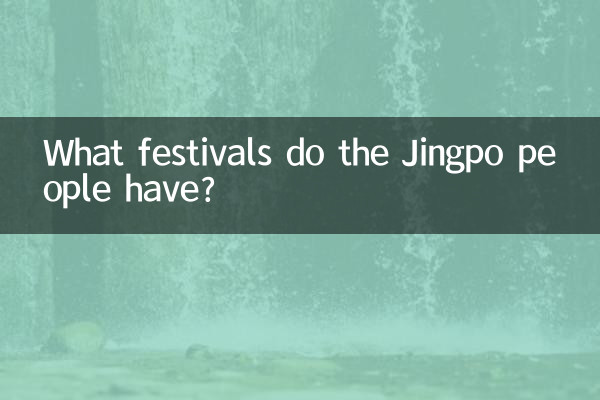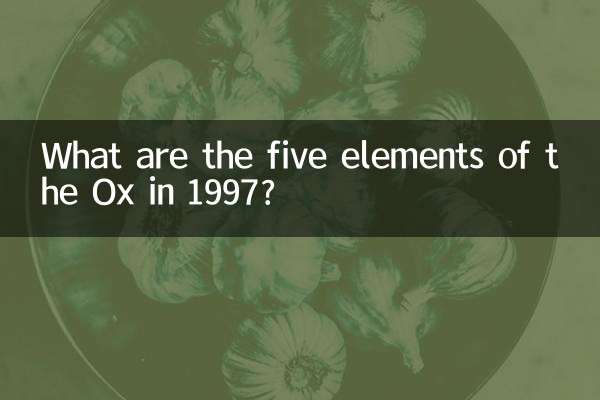What festivals do the Jingpo people have?
The Jingpo ethnic group is one of the ethnic minorities in China, mainly distributed in Dehong Dai and Jingpo Autonomous Prefecture, Yunnan Province. The Jingpo people have rich traditional culture and unique festival customs. These festivals not only reflect the history and beliefs of the Jingpo people, but also demonstrate their lifestyle and national spirit. The following is a detailed introduction to the main festivals of the Jingpo people and their related contents.
1. Major festivals of the Jingpo people

| holiday name | time | Main activities | cultural significance |
|---|---|---|---|
| Munao Song Festival | The fifteenth day of the first lunar month | Group dance, sacrifice, song competition | The grandest festival of the Jingpo people, symbolizing unity and blessing |
| New Rice Festival | August of the lunar calendar | Taste new rice and worship ancestors | Celebrate the harvest and be grateful to nature |
| Torch Festival | The twenty-fourth day of the sixth lunar month | Light torches, ward off evil spirits and pray for blessings | Drive away disasters and pray for peace |
| Flower Picking Festival | Lunar March | Picking flowers, singing and dancing | Welcome spring, symbolizing rebirth |
2. Detailed introduction of Munao Zongge Festival
The Munao Zongge Festival is the grandest traditional festival of the Jingpo people and is known as the "Oriental Carnival". During the festival, Jingpo men, women and children dressed in costumes gathered in Munao Square and danced cheerfully around the Munao Shidong (totem pole). The dance team is usually led by a lead dancer and performs according to traditional routes and rhythms, and the scene is very spectacular.
The Munao Zongge Festival is not only an entertainment activity, but also an important carrier of the cultural heritage of the Jingpo people. During the festival, sacrificial ceremonies are also held to pray for good weather and abundant harvests. In addition, activities such as singing and dancing competitions are also important parts of the festival, demonstrating the artistic talent and national pride of the Jingpo people.
3. Customs and significance of the New Rice Festival
The New Rice Festival is a harvest festival celebrated by the Jingpo people, usually held in the eighth month of the lunar calendar. On the day of the festival, every household will use the newly harvested rice to make delicacies and hold sacrificial ceremonies to thank ancestors and nature for their gifts. The New Rice Festival is not only a material harvest, but also a spiritual sustenance, reflecting the Jingpo people's reverence for nature and love for life.
During the New Rice Festival, the Jingpo people will also hold singing and dancing performances and competitive activities, such as crossbow shooting, wrestling, etc. These activities not only exercise their bodies, but also enhance national cohesion.
4. Characteristics of the Torch Festival and Flower Picking Festival
The Torch Festival is one of the traditional festivals of the Jingpo people. On the night of the festival, people will light torches to drive away evil spirits and pray for peace. The origin of the Torch Festival is related to the ancient legend of the Jingpo people, symbolizing the victory of light over darkness.
The Flower Picking Festival is a festival for the Jingpo people to welcome spring. During the festival, young men and women go to the mountains to pick flowers and decorate their houses and clothes with them. The Flower Picking Festival is not only an activity to enjoy flowers, but also a good opportunity for young men and women to make friends, full of romance and joy.
5. Modern inheritance of Jingpo festivals
With the development of society, the traditional festivals of the Jingpo people are constantly being innovated and passed down. Many festival activities have been integrated with tourism culture, attracting a large number of tourists to experience it. For example, the Munao Song Festival has become an important tourism brand in Dehong Prefecture, with tens of thousands of people participating every year.
At the same time, the Jingpo people also use school education, media publicity and other methods to let the younger generation understand and love their traditional culture. These efforts not only protect the intangible cultural heritage of the Jingpo people, but also add luster to the cultural diversity of the Chinese nation.
In short, the festivals of the Jingpo people are an important part of their national culture. They carry history, beliefs and emotions, and are the spiritual home of the Jingpo people. By understanding and participating in these festivals, we can better understand and respect the unique charm of this nation.

check the details

check the details